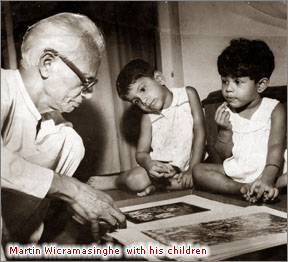|
Glimpse of History from ANCL Archives :
Sage of Koggala
by Indeewara Thilakarathne

Martin Wickramasinghe ( May 29, 1890- July 23, 1976) was a foremost
Sri Lankan novelist who was instrumental in defining the modern Sinhala
novel and bringing it on par with world literatures. He is best
remembered for his trilogy ; Gamperaliya, Kaliyugaya and Yugantaya which
were subsequently turned into films.
Wickremesinghe's works as a writer , author of both fiction and
non-fiction works were dominated by his facination of the villagers and
their slow-moving lifestyle at the tail end of 19th century Sri Lanka.
His famous trilogy is based on the changing phase of the pastoral
village of Koggala and the gradual transition from fuedalism to emerging
capitalism and the change of relationships and attitudues brought forth
by it.
His works were on diverse themes such as natural and social sciences,
literature , linguistics, the arts, philosophy, education, and Buddhims
and comparative religion, sometimes going beyond the traditional
parametres of literature.
He rejected superficial emotionalism of vulgar nationalism, and
guided Sri Lankan readers to the enduring roots of their common national
identity that exists in the folk life and folk culture of Sri Lanka.
His life
Wickramasinghe was born on May 29,1890, in the pastoral coastal
village of Koggala as the only son of Lamahewage Don Bastian
Wickramasinghe, and Magalle Balapitiya Liyanage Thochchohamy. The
village had a lasting influence on his work.
Wickramasinghe wrote his first book Balopadeshaya in 1902, on the
urging of monk Koggala Deerananda Thero. At the time he had been forced
to leave his school in Galle due to financial difficulties caused by the
death of his father. In 1904,he began school again in a cheaper school.
A few years later, Wickremasinghe completely abandoned his schooling,
and began working as a bookkeeper in Colombo, and then at a commissions
agency. In 1910, another tragedy befell him when his mother died.
Martin Wickramasinghe published his first book Leela in 1914, as he
lost his job, and returned to Koggala. He moved to Batticaloa. the
following year, to become a bookkeeper once again.
In 1916, he started to write for the newspaper "Dinamina" under the
pen name "Hethu Vaadi", and joined its Editorial Staff in 1920, the same
year he published his second novel Soma.He followed Soma with Iranganie
and Seetha in 1923, and Miringu Diya in 1925, marrying his wife Kataluwe
Balage Prema de Silva that year, in November.
The two moved to Mt. Lavinia. After their marriage, and had a child
named Susantha Manuwarna, who died in a few months. He joined the staff
of the newspaper "Lakmina" in 1927.
The following years, he and his wife had six children: Sarath Kusum
(b. December 26, 1928), Vasantha Kumara (b. July 16, 1929), Rupa
Malathie (b. February 4, 1931), Himansu Ranga (b. July 16, 1932), Usha
(b. September 30, 1935), and Unie (b. September 13, 1940).
During this period he edited two newspapers, and wrote Unmada Chithra
and Rohini (both in 1929).In the 1940s, Wickramasinghe reached the
zenith of his writing career writing his best known works Gam Peraliya
(1944), Madol Doova (1947), and Yuganthaya (1949). He moved to
Thimbirigasyaya, in this period, to enable his children to go to
college. In the 1950s, Wickramasinghe was awarded the MBE, and started
living in Bandarawela.
He also made several visits to foreign countries. His writing of the
period include Viragaya in 1956, and Kaliyugaya in 1957.During the
1960s, Wicramasinghe did more travelling and received more accolades
including an honorary PhD by the Vidyodaya University. On July 23, 1976,
Wicramasinghe died.The Martin Wickramasinghe Museum of Folk Art, located
within the property of his birthplace, can be visited in Koggala.
Wickramasinghe's novel Gam Peraliya was immortalised in a film
version by Lester James Peries in 1964.
|
